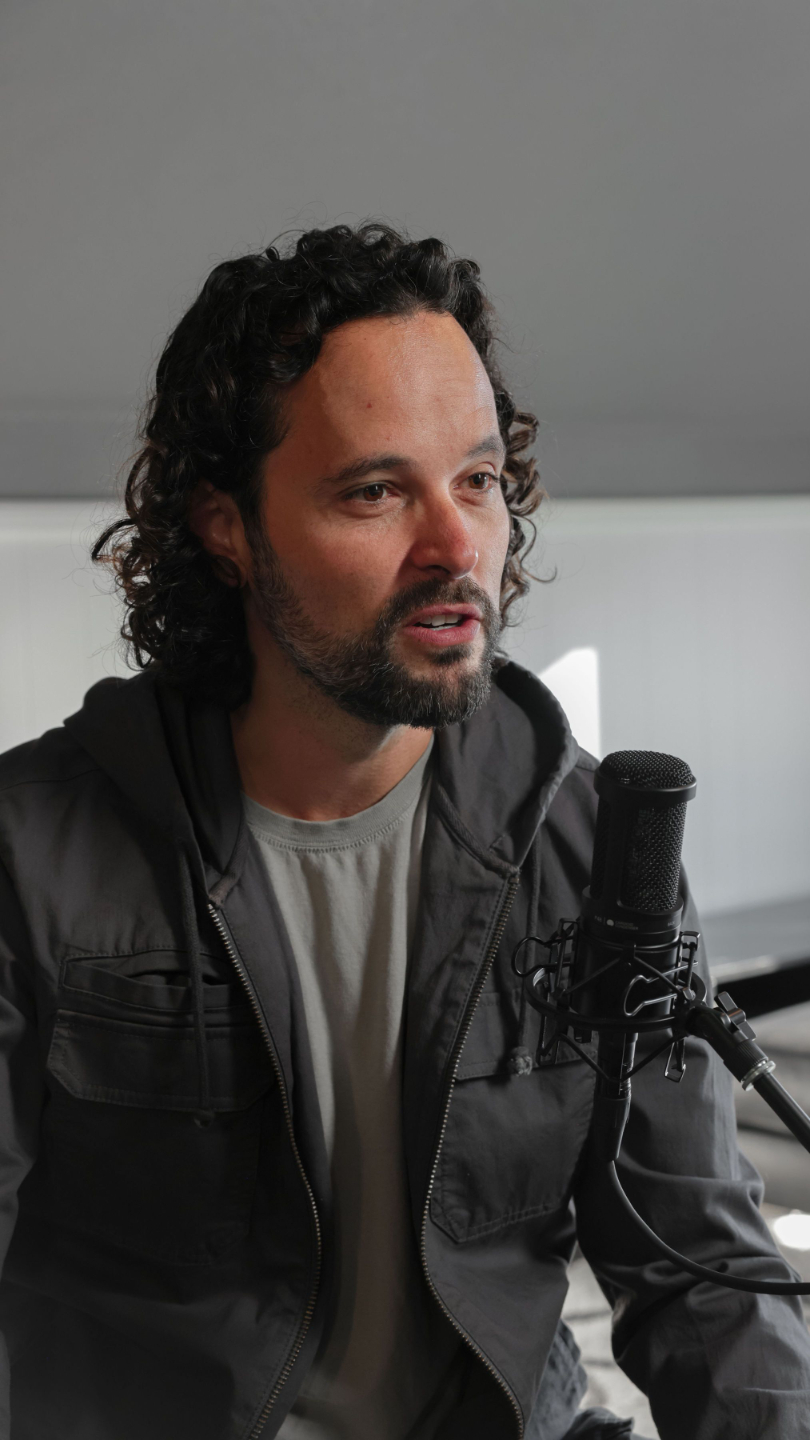You’re Changing — But She Still Can’t Trust It Yet
When Growth Feels Invisible
There's a moment that happens for most guys after you've started doing this work. You handle something better than you would have in the past. You stay calm, you respond with care, and you expect that she'll see it. You wait for the look, the little nod, some sign that she felt the difference, but it doesn't come.
She just moves on and you're left standing there wondering if what you're even doing matters. You don't say anything out loud, but you run it all back in your mind over and over again. You replay the conversation in your head, how you slowed down, how you didn't raise your voice, how you actually listened, and for a second you feel really proud of that, but then the silence comes afterwards and that pride starts to fade.
It's strange, isn't it? You're working hard to change the very things she's been asking for, but when you do, it's like nothing happened. No acknowledgement, no warmth, no shift in her tone, just that same distance. And after a while that silence starts to feel heavier than the conflict ever did. You start thinking, if she can't tell the difference, then what's the point?
Here's what I want you to realize. That moment, the one that feels invisible, is actually one of the most important stages in real growth because early change doesn't show up on the outside first. It happens internally in your awareness, in your restraint, in your choice to do something different, and those changes take time to become something that she can trust.
That's what we're talking about today. Why your progress might not be registering in your marriage just yet, what it takes for change to become something she can feel and how to keep leaning into the work when it seems like she doesn't see you at all. Stick around because what's happening underneath that silence is much more meaningful than you think.
When She Tells You That Your Effort Still Isn’t Enough
Welcome to Better Husband, the podcast that helps you answer the question, how can I be a better husband? I'm Angelo Santiago, a men's marriage and relationship coach, and every week I bring you practical insights to help you strengthen your marriage and become the best husband you can be.
A few weeks ago on a group call with the men in Better Husband Academy, one of them shared something that landed with everyone in the room. He said something along the lines of, my wife told me that she knows I'm doing all this work, the podcast, the therapy, the coaching, but she says, she doesn't see me implementing anything.
And it was quiet after he said it because most of the men there knew exactly what he meant. That feeling of trying, really trying and still being met with doubt. And this isn't the first time I've heard that same line.
I've heard it from loads of men just this year alone. And every time I ask the same question. What kind of changes do you feel like you've actually been making? Usually it's something like this. I'm paying more attention, I'm staying calmer, I'm owning my part when things get tense. They're doing the work, they're showing up differently.
But from her side, it still doesn't feel like change she can trust. And that's one of the hardest realities to face. Because when you're trying, when you're aware of how much effort it takes to unlearn old habits, it can feel discouraging to realize she can't feel it yet. And you start wondering what's the point?
You tell yourself if she can't see the difference, maybe it's not even worth it, but here's what's really going on. She's not blind to your effort. She just hasn't learned to believe it yet. For her trust doesn't rebuild through observation. It rebuilds through experience and experience takes time. She's still waiting to see if this new steadiness holds when life gets hard again, and if your calm lasts beyond the good days.
That's why this stage of change feels so quiet, because it's all happening beneath the surface. You are becoming someone new, but she's still relating to who you used to be. Her guard is still up. Her body is still waiting for the old pattern to return, and even though that's painful, it's not proof that what you're doing isn't working.
It's proof that the work is still unfolding. That's the gap so many men find themselves in: growing internally, but still waiting for the outside world to catch up. It's uncomfortable, it's slow, and it's real. Because it's also where transformation takes root, because what happens in that space before anyone else can see the difference is what determines whether change actually lasts.
The Quiet Stage of Change
If you've ever felt like you're doing the work, but no one around you can feel it yet you are. In this stage. It's the normal, messy middle of growth. The part where your effort is real, but your partner's trust hasn't caught up yet. You're learning new tools, staying aware, catching yourself before old patterns take over.
You can feel the difference inside yourself. It's not theory anymore, it's showing up in real moments. But when she still responds with distance or skepticism, something in you starts to tighten up. You think, what else do I have to do? It's easy to take that personally, but what's really happening underneath is something deeply human.
For most women, especially those who felt dismissed, unseen or unsafe for a long time, trust doesn't return just because behavior changes. It returns when her body starts to believe the environment is different, and that takes time. Think about it this way. Her nervous system has been living with the version of you that reacted, withdrew, or went cold or whatever it was that you did.
That memory doesn't disappear. The moment you start showing up differently, it's like a muscle that's been tensed for years. It doesn't know yet that it can relax. So even when you're calm and kind, her guard is still up because her body's waiting for the other shoe to drop. That's why early change feels invisible.
You might be showing up differently, but the energy she feels, the tone in your voice, your timing, your eyes still carries traces of old tension. And until her system learns through repetition that those old moments aren't coming back, she won't fully feel safe enough to let her guard down. That middle space can feel lonely, but there's a way to stand there with strength without proving and without withdrawing.
Staying Steady When She’s Unsure
When change starts, but recognition doesn't. Most men assume they're doing something wrong. You expect a little encouragement. Some sign that your effort is making a difference, and instead you still get hesitation or maybe even silence, or maybe even suspicion. The instinct in that space is to reach for control.
You wanna prove you've changed, explain your thinking, or remind her the progress you're making. But the more you try to convince her, the less safe she feels. Because proving still carries the energy of pressure or being right. What she needs isn't persuasion. It's consistency. Consistency says, I. Don't need you to believe me right now.
I'll show you until you can. And that kind of steadiness only comes when you stop measuring your growth by her immediate response. If her reaction is the only proof you're looking for, you'll burn out fast. Real growth has to be anchored in something deeper and the knowledge that you're becoming the man you said you wanted to be, whether she acknowledges it today or not.
Think of it like rebuilding a bridge that's been damaged. You can repair the foundation and reinforce the supports, but until enough weight crosses safely, no one trusts it yet. She's not testing you to punish you. She's testing the structure to see if it holds. Every calm response, every choice to stay curious instead of defensive, is another plank that strengthens what you're rebuilding.
That's what slowly rebuild her sense of safety.
It might sound simple, but you know it's not easy because silence can feel like rejection. And if you've spent years trying to earn love through performance, through achievement or humor or problem solving, sitting in that silence without rescuing yourself from it feels unbearable. But this is where integrity grows roots.
Steadiness doesn't mean you stop caring about her response. It means you stop depending on it, to validate your direction. You keep leading gently, not because it guarantees a result, but because that's the man you want to be. Present, patient, and trustworthy.
Learning the Skill of Transmission and Reception
In relational life therapy, we talk about something called transmission reception work, and it explains so much about why this stage can feel frustrating.
Transmission is everything you send out, your words, your tone, your timing, your energy, even your body language. Reception is what your partner actually takes in her openness, her readiness, her capacity to believe that what she's hearing is safe and real. In RLT, we describe it this way. Partner A keeps asking for something. More closeness, more vulnerability, more connection.
Partner B starts doing the work and begins offering exactly that. You'd think partner A would be thrilled, right? But usually that's not what happens. Instead of receiving it with open arms partner A hesitate. She doubts it, tests it, or find reasons why it doesn't count. Why? Because trust doesn't instantly flip from closed to open.
Her nervous system remembers years of disappointment. It wonders, is this real? Is this temporary? Is this safe to take in? So even when your transmission is clean, meaning you're calm, honest and direct, her reception might still be blocked. That's not a failure on either side. It's the natural rhythm of relational recovery.
You're both learning to meet in the middle again, and it works both ways. She transmits too through words, silence, even affection. Your job is to stay open enough to receive it, to hear the meaning underneath the tone, to take in the compliment instead of brushing it off to stay curious, even sometimes when it stings.
The more both of you practice clean transmission and open reception, the more safety builds in both directions. So how do you support her in becoming more receptive? There are two simple moves that can make a real difference. The first is about inviting her to be open to receiving before diving into something emotional, just ask, is now a good time for a quick check-in?
Keep it short and clear because safety grows when the conversation has boundaries. The second is all about following up after you've shared something important, or she has pause and ask in your own way. How did that land? Or Is there any more you wanna add? Then stop talking and listen. Let her reaction teach you what she can receive right now.
The key here is patience. You've spent years learning how not to connect this way, and she spent just as many years bracing against the old version of you. It takes repetition before her system can trust the new one. So keep transmitting with clarity and kindness even when it feels like it's not landing yet.
Every healthy transmission, every moment a patient brings hers one step closer to being able to receive you fully again. And once she finally starts to receive it, that's when the real rebuilding begins. Not through words, but through small daily actions.
Building Trust Through Small Moments
If you've ever tried to rebuild trust after years of tension or distance, you know how humbling it is. You can't fix it with one big apology or a weekend of good behavior. You can't logic your way back into her heart. You have to earn safety again. One moment at a time. Most men overestimate what big gestures can do and underestimate what small consistency does they think of in terms of breakthroughs.
The long talk or the heartfelt letter, the vacation that resets everything. Those things can help, but they don't change the atmosphere of daily life in your marriage. What does or the micro moments, tiny repeatable choices that slowly teach her nervous system that you're safe now. Here's what that looks like when she brings up something painful from the past and you stay grounded instead of defending or shutting down.
When you notice her tone change and you choose curiosity instead of correction or being right. When you follow through on the small things you said you do that errand that. Text the time you said you'd be home and you do it without needing her praise. Those moments seem minor, but to her, they're evidence. Each one quietly says that I'm here, I care, and I'm staying with this.
Repairing trust isn't glamorous, it's slow. Often unnoticed work, and because it's subtle, most men abandon it before it compounds. They expect the warmth to return quickly, but emotional safety doesn't operate on the same timeline as effort.
One of the best ways to start building that consistency is through presence When she talks, stop multitasking. Turn toward her. Let her see that she has your attention, not just your ears. Presence is one of the most powerful demonstrations of love.
Another small but powerful move is humility. When you get something wrong, even in a minor way, own it immediately. Don't wait until she points it out. Say, you're right. I missed that and mean it.
The more she experienced that kind of accountability, the safer she feels being honest with you. When you start stringing those small actions together, something subtle begins to happen. Her tone might soften or she might exhale around you.
That's her nervous system beginning to recalibrate. What often gets overlooked here is that these small moments change you too. Every time you stay grounded, every time you choose empathy over ego, you're rewiring your old habits. You're teaching yourself how to stay present under pressure.
In this next section, we're gonna look at what happens when she finally begins to feel that safety again, and how you need to respond in a way that deepens connection instead of rushing to closure.
What to Do When She Starts to Trust Again
Like I mentioned earlier, if you stay steady long enough, something begins to happen. She starts to relax. It might be small at first, like the softer tone or the longer glance, or a sigh that feels more like relief than frustration. And those are all signs that her body's beginning to believe what you've been showing all along, that this new version of you is real.
But this stage doesn't come with a clear announcement. She won't say, I trust you again. It shows up in the way. She lingers in the same room as you a little longer or sits next to you on the couch without words.
It shows up when she brings up something vulnerable just to see if the space between you can hold it. That's the moment your consistency starts to bear fruit and what you do next determines whether that fruit keeps growing or falls flat.
Because when a woman starts to feel safe again, the natural impulse for a man is to rush in, to close the distance quickly, to make up for lost time, and you want to lean in to connect, to move forward.
But if you move too fast, you can collapse the very safety you just built. She doesn't need intensity. She needs reassurance. She needs to feel that the steadiness she's come to trust isn't dependent on her approval. So when she softens match that softness, don't push for declarations or milestones. Let the new rhythm unfold naturally. Respond with presence.
Notice the small way she's open up -humor, a question, a hand that lingers on your arm- and meet it with gratitude.
When she starts to open up, she's not testing you anymore. She's reaching for you again, quietly, cautiously, with hope that it's safe to do so. Your job in that moment is to make sure she's right, to keep bringing the same grounded energy that helped her trust you in the first place. That's the real proof of change.
Not that you can stay calm when things are hard, but that you can stay humble when things are good because early trust can vanish as quickly as it returns if you start looking for credit instead of connection. Or if you show any signs of returning to your old ways, habits, reactivity or shutdown.
Let her warmth be a gift. Receive it, appreciate it, and cherish it, but don't make it the new condition for your effort.
When you keep showing up in this way, something extremely important happens. The focus shifts from proving you've changed to living the change. You stop worrying about whether she sees it and start paying attention to how you carry it, and over time that presence becomes the new atmosphere of your marriage.
Conflict still happens, life still gets busy, but the foundation feels different. The edge that used to live underneath, everything softens the room, feel safer, and safety is what makes desire possible again.
That's the payoff of this whole process, not just a calmer marriage, but a deeper one. A relationship where both of you can bring your full selves without walking on eggshells, where trust isn't a topic of conversation anymore, it's the air you both breathe.
So when she finally starts to feel it, slow down. Stay grounded. Keep tending the small things that got you here. Because what you are rebuilding isn't just her trust, it's your integrity, your presence, and your capacity to love well. That's what this work is really about.
In the final part of this episode, we're gonna bring all of this together, how to keep this growth sustainable long term so that the man you're becoming isn't just a phase, but the foundation for the rest of your marriage.
Living What You’ve Learned
By now, you've probably realized this work isn't about learning a handful of new skills or memorizing the right responses. It's about building a different way of being one that's rooted in awareness, humility, and steady presence. It's about living your change, not performing it.
The truth is you can't force someone to see your growth. You can only embody it long enough for it to become undeniable. And when it becomes undeniable, you don't have to talk about it. It speaks for itself. That's the difference between proving and living. Proving is anxious.
Living is grounded. Proving demands evidence, living creates it.
So if you're in that messy middle place right now, the place where you're doing the work, but she still seems unsure, don't give up. Stay the course. Keep choosing integrity over impatience. Keep leading with curiosity over control. Because this stage of change, the one where no one sees it but you, is where the root grows deep.
It's what keeps the next storm from knocking everything down again. And here's the paradox. When you stop needing her acknowledgement to stay consistent, that's usually when she finally starts to feel it. Because your effort stops carrying the tension of needing something back. It becomes generous again.
It becomes love without agenda. And from there, something new begins to take shape. Not the old marriage repaired, but a new one built on mutual respect and safety where she doesn't just hear you say you've changed. She experiences it in the way you move through conflict, the way you listen, the way you take responsibility without collapsing into guilt.
That's what leadership looks like in love.
So as you walk this out in the days ahead, remember this growth isn't about waiting for validation. It's about becoming the kind of man whose presence is its own evidence. It's about letting your change speak through how you live, not what you say. Because the goal of this work isn't just for her to see it, it's for you to become it. To embody the kind of steady grounded love that makes trust feel possible. Again, that's the man who transforms a marriage. That's the man who leads with integrity, and that's who you're learning to be. One moment, one choice, one small act of consistency at a time I.
Putting It Into Practice — Staying Grounded When She Doesn’t See It Yet
All right, let's make this real. If you've been listening and thinking, yeah, this is me. You're doing the work showing up differently, but she still doesn't seem to feel it, here's where to start.
One, lead with consistency, not explanation. The next time you feel that urge to say, can you see i'm trying? Stop yourself. Take a breath, and instead of talking about your effort, let it show through your actions. Follow through on something small. Speak calmly when tension rises. Stay present when she brings up something challenging.
Two. Acknowledge your progress privately. Don't wait for her recognition to validate your growth. At the end of the day, take a minute to notice one way you showed up differently. Maybe you pause before reacting, stayed open in a hard moment, or simply listen longer than you used to. And write it down, or just sit with it. Let that quiet acknowledgement help your nervous system. Trust the process even when the results aren't visible yet.
And three, practice generosity in the waiting when she's still guarded or distant. Remember, that's not rejection. That's her nervous system. Learning to trust again. Give her the grace to move at her own pace. Give her space when she needs it. Stay kind, steady and engaged, then take a breath.
That's what trust work really is tending, not proving, because let me remind you, once more trust is rebuilt through the small, steady rhythm of showing up the same way day after day, until her body finally believes it's safe to relax again.
Reflection Questions
Before you move on with your day. Slow down for a moment. Sit with these questions. I've created them to help you notice where you are and where the real work lives for you.
First, where in your marriage do you still focus on being acknowledged instead of being consistent?
Second, what moments make you question your progress?
Third, how can you remind yourself that real growth often feels like restraint, not reward?
And finally, if she started trusting this new version of you tomorrow, how would you show up to protect that trust and keep it growing?
Write a few of those thoughts down, you'll be surprised what comes up when you put it on paper.
Closing Takeaway — Let Her Feel the Man You’ve Become
What I hope you take away from this episode is encouragement to keep going because change doesn't always get noticed right away. Sometimes it takes time for your consistency to turn into safety and safety to turn into trust.
Every time you stay calm, when you could react. Every time you listen instead of defend. Every time you take ownership, instead of explaining, you're giving her something she can feel.
You're teaching her body that it's safe to believe in you again. That's foundational work, so don't rush it. Don't perform it. Don't wait for her to praise you. Just keep living it because what she's waiting for isn't more words.
It's the confidence of a man who no longer needs to prove he's changed. She'll feel it when your steadiness outlasts her doubt. She'll trust it when your actions match your tone over time and when that happens connection returns naturally. If you can relate to the story the men shared during our Better Husband Academy office hours, feeling like you're doing the work, but it's still not landing the way you hope, then Better Husband Academy might be the exact support your marriage needs.
It's where men come together to learn these skills in real time, get coaching and practice the kind of steady leadership we've been talking about today. If you wanna learn more, visit betterhusbandacademy.com or send me an email at angelo@angelosantiago.com. I'll include both links in the show notes below.
So thanks for listening. I'm Angelo Santiago, and this is Better husband.







